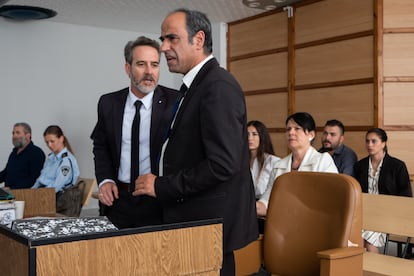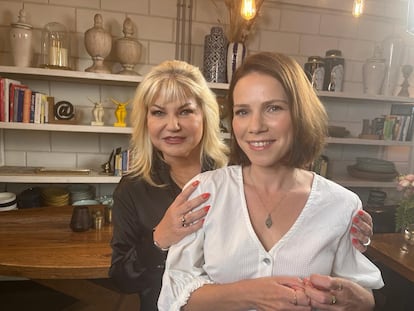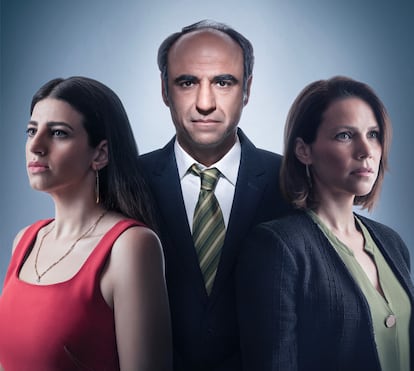‘Unsilenced,’ Israel’s Me Too before Me Too
A fiction series takes on the 2011 rape accusation of the then-president, Moshe Katsav. The case had such an impact on the country that only television has dared to deal with it

A decade before the term Me Too was popularized thanks to the sexual assault accusations against powerful Hollywood producer Harvey Weinstein, an ex-employee of the then-Israel president, Moshe Katsav, broke another decades-old wall of silence. She told the police how Katsav raped her on the sofa of the presidential office in Jerusalem. It was 2006; society was much more complacent about sexual violence. Katsav was a Sephardic Jew who, as he recalled in a press conference to defend his innocence, almost died of pneumonia as a child because of the cold in the tent where his family lived after emigrating from Iran. He was a symbol, that is, that the role of head of state was not reserved exclusively for privileged Jews of European origins.
After the initial accusation, other women brought to light similar reports, resulting in a seven-year prison sentence that Katsav finished in 2018. The case was barely known outside the country, but it impacted Israel so much that it continues to digest it. The miniseries Unsilenced is the first to fictionalize the incident.
While many people were doubting the accuser, questioning her intentions and her way of dressing, another woman jumped onto the stage. She was Odelia Carmon, one of the show’s creators. Her experience appears through the character of Avigail, Katsav’s former media advisor, Carmon’s job at the time of the incident. “I don’t know what each one of the victims felt, but I introduced what I have seen and researched as a psychotherapist who works with victims of sexual violence, exploring dynamics of power and control. I think that’s why so many women are identifying with it,” she tells this newspaper over the phone. Carmon believes that Me Too “has changed few things in practice,” but it has made the show possible. “They started to understand what I’m talking about. Suddenly, they were prepared to listen,” she says.

The series — produced by Yes, the same Israeli cable television channel behind Fauda and Shtisel — is a single season with six episodes of under an hour long. Each one depicts a different point of view: two victims, the president, his wife and his Machiavellian advisor, plus a final collective episode. It does not use the old trick of showing the same situation from different perspectives, but rather changes the gaze as the plot advances.
The show is not a documentary or a precise retelling of the facts. The order and rhythm of the events are not faithful to reality. And the name of Katsav, played by Yaakov Nada-Daniel (Eli in Fauda) is never mentioned. He is simply “the president.” “It wasn’t necessary for the message,” Carmon says. “And the script requires dramatic resources and does not include everything.” It is, as the final credits clarify, a work of fiction based on Carmon’s personal story and her book The Confidante.
Exploration
The series functions as a thriller as it retells the obstacles the women face in proving a rape. An issue that is present, for example, in the interrogation of Katsav’s wife Shula, carried out by a young police officer who is investigating the case amidst societal taboos. Shula asks her what the victims are looking for. “Just to be believed,” she answers. During the trial, the president’s lawyer accuses Avigail of being an opportunist for keeping quiet for convenience in the face of rumors about other women. She responds: “Maybe I’m a self-serving opportunist, even a flirt. But how does that change the fact that your client is a serial sex offender who pulled out his penis and asked me to touch it, who threw me on a bed in a hotel room and tried to rape me?”
The mechanisms of male violence are also clear: the mixture of compliments and threats, promises of promotion and punishments and apologies with the purpose of making amends, even more so when the aggressor can destroy a life, as the president does with the first complainant, Oshrat, forced to return to her job stocking shelves in a supermarket.
The fictional turning point comes when the police discover a box while searching the presidential residence. It’s full of parting gifts and resignation letters. He realizes that they are all by women and, although each one has written and signed it, the text is almost identical. And that the farewell gifts come from the same store. It is the “insurance policy,” according to Avinoam, Katsav’s right-hand man who dictated the text to the victims to be able to refute, in case of problems, that they had been raped because they left work “full of gratitude.”
It is a key element of the plot: why are they accusing him now? Why did they continue to work with the president until two years after the rape?

One of the plot’s themes is the particularity of the allegations of sexual assault: doubts about the veracity, the years of silence and possible political motives, especially with a president. “I wanted to introduce this issue because it is always there. Who do you believe? The teacher or the student? The president or the porn actress?” Carmon says, referring to the case of Donald Trump and Stormy Daniels.
When, in a meeting, the State Attorney General insists that there is no evidence, the police investigator responds: “You make the same mistake all the time. You don’t understand that rape victims are not dolls that remember what you want them to remember, nor do they say what you want them to say. They are women who have been through hell. They dissociate, they remember, they forget. If we don’t listen to them and believe them, I don’t know what we’re doing here.”
“The case was transformative,” recalled the newspaper Haaretz after the series premiered, “but in a country that finds every day a way to break the hearts of its citizens, an information cycle that never stops and a generally misogynist agenda, the Katsav affair has taken a long time to receive the cultural expression it deserved.”
Sign up for our weekly newsletter to get more English-language news coverage from EL PAÍS USA Edition
Tu suscripción se está usando en otro dispositivo
¿Quieres añadir otro usuario a tu suscripción?
Si continúas leyendo en este dispositivo, no se podrá leer en el otro.
FlechaTu suscripción se está usando en otro dispositivo y solo puedes acceder a EL PAÍS desde un dispositivo a la vez.
Si quieres compartir tu cuenta, cambia tu suscripción a la modalidad Premium, así podrás añadir otro usuario. Cada uno accederá con su propia cuenta de email, lo que os permitirá personalizar vuestra experiencia en EL PAÍS.
¿Tienes una suscripción de empresa? Accede aquí para contratar más cuentas.
En el caso de no saber quién está usando tu cuenta, te recomendamos cambiar tu contraseña aquí.
Si decides continuar compartiendo tu cuenta, este mensaje se mostrará en tu dispositivo y en el de la otra persona que está usando tu cuenta de forma indefinida, afectando a tu experiencia de lectura. Puedes consultar aquí los términos y condiciones de la suscripción digital.









































